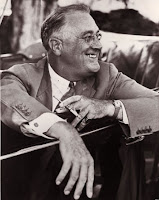“[T]he United States in the thirties went far beyond my personal experience. The nation that [Alexis de] Tocqueville had destined to share dominance over half the world realized that, in effect, only a continental state could be a modern state; in the thirties, the U.S.A. had to decide what to do with its new worldwide power, and Franklin Roosevelt taught us to believe that the first thing was for the United States to show that it was capable of living up to its ideals. I learned then — my first political lesson — that this is your true greatness, not, as was to be the norm in my lifetime, material wealth, not arrogant power misused against weaker peoples, not ignorant ethnocentrism burning itself out in contempt for others.
“As a young Mexican growing up in the U.S., I had a
primary impression of a nation of boundless energy, imagination, and the will
to confront and solve the great social issues of the times without blinking or
looking for scapegoats. It was the impression of a country identified with its
own highest principles: political democracy, economic well-being, and faith in
its human resources, especially in that most precious of all capital, the
renewable wealth of education and research.
“Franklin Roosevelt, then, restored America’s
self-respect in this essential way, not by macho posturing.”—Mexican
novelist-essayist Carlos Fuentes (1928-2012), “How I Started to Write,” in Myself With Others: Selected Essays (1988)

No comments:
Post a Comment